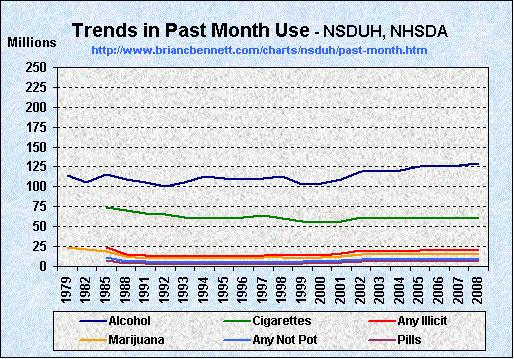The statistics around incarceration rates in the US are rather impressive. The percentage of Americans in our prison systems has been rising exponentially since the 1980's, which coincides with the start of the War on Drugs, specifically the Anti-Drug Abuse Act of 1986 (see chart below). Even more depressing, the US incarcerates more people than any other nation in the world weighing in at 2.4MM inmates. To put this into perspective, China's population is nearly 4x ours and their prisons hold 1.6MM.

There are a couple major drivers in this incarceration rate increase. First, the US has longer sentencing periods than other nations, which drives up the rate. Second, the Anti-Drug Abuse Act of 1986 included mandatory minimum sentencing for drug related offenses. As a result US prisons went from holding 40,000 inmates due to drug related crimes in 1980 to approximately 500,000 in 2011.
A 2008 study shows the US spends $44B annually on law enforcement for the War on Drugs plus an annual cost of $11B to imprison offenders. On top of this, the US provides other countries funding to fight drug totaling in the hundreds of millions. Obviously, there are significant resources being deployed in this effort. The question is, is it worth it?
The good news is, immediately following the passing of the Anti-Drug Abuse Act, there was a modest decline in the recurring use of narcotics (see below or follow this link). Unfortunately, the use has been trending upwards, although just slightly. A review of the numbers shows the relative drug use pre and post passing of the Act to be about 2MM people. The number of people who become addicted and subsequently ruin their lives is only a fraction of the 2MM.

Again, is $55B+ annually worth it? To put it another way, the current US population is 307MM. Does it make sense to force the remaining 305MM (99.3%) to pay $55B, in a deficit spending fashion, on a venture which may keep 0.7% from engaging in recreational drug use??? For me, the response is an emphatic NO.
So far, I've focused only on the economic impact of the War on Drugs. A much more emotional argument could be made for the cost in lives lost due to the drug cartels created by our laws. The legalization of drugs would almost immediately undermine the power of drug dealers/cartels, not to mention potentially infuse the US economy with an estimated $30B+ in tax revenues. Those revenues plus the reduction in tax payer liabilities would be an excellent start to reduce our deficit and, more importantly, would be a step closer to a truly free society.
In summary, the War on Drugs is a poor investment of resources. It is modern day prohibition, and just like prohibition in the 1920's, it is a futile and violent effort. Individuals in a free society should have the right to engage in whatever activity they so choose, as long as it does not infringe on other peoples' life and property (especially in their own homes). The data shows this policy does not make our country more safe and the cost associated certainly does not make us more prosperous. It is government over-reach of the worst kind: it infringes on our lives, liberty, and prosperity.
No comments:
Post a Comment